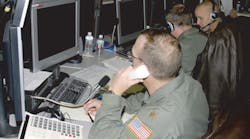By John McHale
Everyone knows the necessity of securing the homeland. The terrorist attacks on Sept. 11 made it crystal clear. Despite that, the status of the proposed Department of Homeland Security is still mired in Congress, the necessary money is not getting to the right people in state, local, and federal government agencies, and our borders are vulnerable to an even more devastating attack on our country.
Protecting the homeland is much different from fighting a conventional war. With war against a foreign power we know where the threat is, deploy our forces, and attack; our own civilians are not usually involved. Now we are on the front line. We could be pumping gas and get shot in the head, open a letter and die from anthrax, or stand in line for a burger and get blown up. The threats are everywhere.
Gaping holes riddle border security, while airport security and water supplies are still vulnerable. The terrorist attacks of last year made painfully obvious why federal agencies such as the FBI and Immigration and Naturalization Service need to share intelligence data with local and state law enforcement officials. Maybe if there had been better intelligence sharing, suspected terrorists would not have seen their way clear to enroll in a Florida flight school.
Meanwhile, U.S. ports remain so insecure that ABC News personnel were able to transport radioactive material all the way from Eastern Europe into the Port of New York - and cleared U.S. Customs in the process. The lack of security in European customs, while not surprising, was scary enough. Yet the inability of our own customs agents to block 15 pounds of depleted uranium from entering into the country - uranium that could be used to make a nuclear bomb — was appalling.
Even before Sept. 11, our security agencies personnel could stand improvement with additional personnel, better training, and the latest electronics technology. Today the need is even more pressing. Not only would state-of-the-art electronics improve surveillance at borders and airports, but also at nuclear and chemical plants, sporting arenas, and other facilities where the public gathers en masse. Better sensors also are needed to detect chemical and biological attacks. Computer networks and databases need better protection from information attacks on government, financial institutions, and private industry.
This is where Homeland Security Electronics, a supplement of Military & Aerospace Electronics comes in. We are on top of the issues regarding funding for technology, the types of technology needed, and who's going to provide that technology.
In Homeland Security Electronics, for example, we have a feature covering the technology that screens baggage and passengers at airports. In addition, stories cover facial recognition technology, which industry experts claim can identify suspects with a success rate better than 90 percent.
We also break down the numbers behind the proposed funding. From the Department of Homeland Security, industry experts are predicting anywhere from $3 to $5 billion a year for electronics alone — and maybe a lot more. New technology will be necessary in some areas, yet many electronics suppliers have technology now that they can adapt for homeland security.
The Defense industry will play the major role in providing these electronic solutions. The military already uses electronic systems that could immediately help local, state, and federal law enforcement officials and we have a feature that looks at how they are preparing to do that.
We are committed in the long term to provide news and in-depth analysis regarding technology for homeland security.


